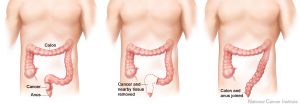Is There A Key To Reducing Colon Cancer?
Colorectal cancer, which is the general term for colon or rectal cancer, is the third most diagnosed cancer in the United States with an individual diagnosis chance of about 1 in 20. Because it rarely exhibits early symptoms it was also the third-leading cause of cancer death in 2014 according to statistics from the American Cancer Society, read the statistics here.
Colorectal cancer might take fifteen years to develop, initiating as an innocent polyp or dysplasia, which is an area of the lining of the colon which looks different only under a microscope. If discovered early it is often treatable. But is it preventable? The medical consensus is that there are certain risk factors for developing colon cancer that can be addressed early to prevent colorectal cancer, just as there are lifestyle decisions you can make to reduce your chances of developing colorectal cancer.
Can Colon Cancer Be Prevented?
There are some things that one can do to try and prevent colon cancer as much as possible. The following are suggested:
Get screened regularly: Because colon cancer is a slow-developing disease, being screened regularly can detect pre-cancerous polyps before they have a chance to turn into cancer. The typical age to begin screening is 50, but if you have a family history of any kind of cancer you should be screened earlier.
Drop unhealthy meats: Don’t eat a lot of red meats (liver, pork, beef) or processed meats like hot dogs/bologna.
 Eat healthy: A diet of fruits, vegetables, and whole grains isn’t just good for your general health, it can help minimize your chance of developing some cancers.
Eat healthy: A diet of fruits, vegetables, and whole grains isn’t just good for your general health, it can help minimize your chance of developing some cancers.
Eat more fish: The Omega-3 Fatty acids in fish can lower your risk of cancer. If you don’t like fish they have supplements at most retail outlets.
Become more physically active: you don’t have to run a marathon, but simply adding physical activity to your daily routine allows your digestive system to run at maximum efficiency. Simply walking a half mile a day helps. Obesity is a trigger for many diseases, and with extra weight comes an extra risk of developing many kinds of cancer.
Quit smoking: Just as smoking contributes to your chances of developing lung cancer, the carcinogens in the cigarettes can also affect your other systems.
Reduce alcohol: If you drink you are putting more strain on your liver and the rest of your body.
Take family history seriously: If you have a family history of cancer get screened earlier. Some people have inherited genetic defects that make them more susceptible to getting cancer. In fact, between 5-10% of those who develop colon cancer have inherited these mutations.
What Are The Proven Prevention Methods?
While there are many scientifically proven ways to decrease your chance of developing colon cancer, there are as many theories to preventing colon cancer that are not yet scientifically verified but still worth considering. Some believe that working third shift for many years can increase a woman’s chance of developing colon cancer due to changes in the level of melatonin that occur. Others believe that taking vitamin D and calcium supplements reduces your chances of developing colon cancer. Still others believe that taking NSAIDs like aspirin and Ibuprofen lower your chances of developing the polyps that eventually change into pre-cancerous cells and ultimately can turn into colon cancer.
There are as many non-scientific views as to how cancers begin as there are scientists studying the cancer cells through the microscope. While there are no guarantees that you will not someday develop cancer, taking any kind of precaution is better than doing nothing at all.







